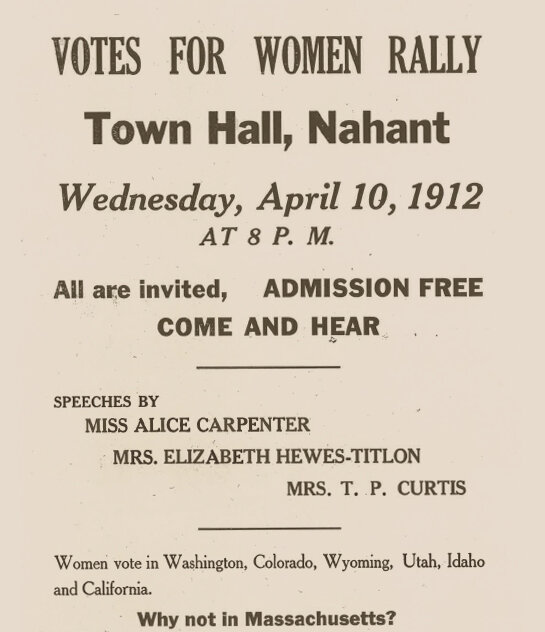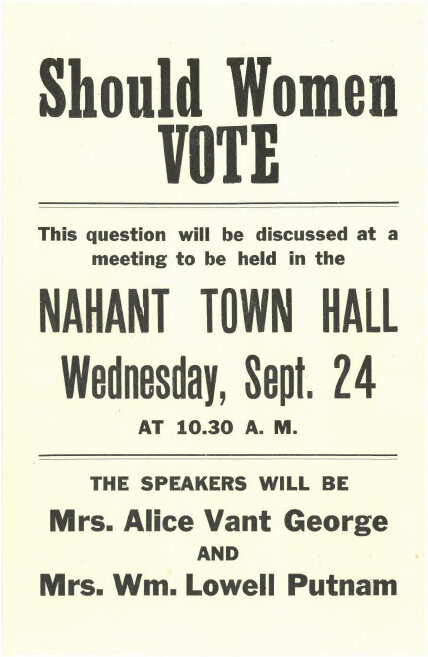Daily Evening Item – Lynn, Mass Monday March 30, 1914
“NAHANT WOMEN AFTER SENATOR LODGE, ET AL” - "Nahant women suffragists will throw down the gauntlet to Senator Lodge and other political leaders in their town who are anti-suffragists and will organize a Women Suffrage league there. They have decided to hold a meeting in the home of Mrs. Thomas P. Curtis next Friday afternoon at 3 o’clock and there and then they will form Nahant’s first suffrage league.
Recently Mrs. Curtis was one of the candidates for the school committee of Nahant. She argued that there should be a woman upon the school board and made a hot battle for the place. When the fight was nip and tuck, Senator Lodge made a speech, in which he stated that he had voted for Mrs. Curtis’ opponent.
Senator Lodge’s attitude, the suffragists feel, was in a large measure responsible for swinging just enough votes to cause her defeat. Mrs. Curtis’ defeat caused the suffragists in that town to decide to form a suffrage organization there. It is planned to make the Nahant Equal Suffrage league one of the most active suffrage organizations in the State. Mrs. Curtis in the chief marshal of the big suffrage parade which is to be held in Boston on May 2 next."
This was not the first time Mrs. Curtis, a summer resident of Nahant, had some words for Senator Lodge. In April of 1912 Mrs. Curtis, a member of the executive board of the Equal Suffrage association, was the key speaker at a ‘votes for women’ rally at Town Hall. Mrs. Curtis reported to the Daily Evening Item that she ‘hopes to convert the Senator to her cause….. Other states have appreciated the benefits of this movement and are taking it seriously, and it stirs my civic pride to think that Massachusetts is behind in the race. I expect a large gathering in the Town Hall this evening, and when Senator Lodge comes home from Washington I shall be waiting for him. As soon as he is rested I am going to try to gain his endorsement and support”.
We are not entirely sure how that planned meeting went as there are no more articles on the suffrage movement in Nahant until September of 1913. This time, however, Mrs. Curtis was not a key speaker as the meeting was for anti-suffragettes, or the Massachusetts Association Opposed to the Further Extension of Suffrage to Women. The women speakers on this occasion were Mrs. Alice Vant George and Mrs. William L. Putnam.
Mrs. Putnam gave statistics of the anti-suffrage movement. She said, “there was nothing destructive, but entirely constructive in the movement. It was their desire to have woman accomplish all that she could.” She was not pleased at the prospect of a visit from Mrs. Pankhurst (Emmeline Pankhurst, best known for organizing the UK suffragette movement.) Mrs. Putnam said that ‘women must keep out of politics. In 90 percent of cases, the women would follow their husbands, and the betterment desired could not be obtained. The reason we believe in not giving the vote to women is that we feel we can do better work without it”.
The second speaker, Mrs. Alice Vant George, said that ‘the suffragists are behind the times….Women’s superiority or inferiority is not based on whether she has identical rights with man. There is a lot of talk about rights and too little talk about the duties and responsibilities of women. We cannot treat women in industry like men, for we must protect the future motherhood. If every in the history of our country there was a demand for calm judgment and sober reason, it is now. Two great menaces to the suffrage cause are militancy and socialism’. Mrs. George urged that women “be more careful before allying themselves with causes detrimental to the great cause of being a woman. The advocacy of bomb-throwing and lawlessness as has been made by prominent suffragette speakers proves that women are not yet fit to vote”.
Women from neighboring cities and towns attended this meeting. Suffragettes and Anti-suffragettes. According to the Lynn Evening Item, both sides of the issue ‘felt well repaid’ for attending the ‘anti’s’ meeting. At future rallies, Mrs. Curtis made it clear that she is against the methods of English sisters, who go around armed with war club and hatchets.
In February of 1915, the Massachusetts State Legislature passed a bill allowing for Women’s Right to Vote to be on the ballot in November. Mrs. Curtis was ‘perfectly delighted with the splendid vote’ and was confident that ‘when the question is put on the ballot, that we shall win”. A statement in the Daily Evening Item on February 17th by Mrs. Thomas Roland, then chairman of the Nahant Women’s Suffrage stated, “Of course, I feel very glad that we have at last secured the chance to place the suffrage bill before the people. I am very sorry, however, that the vote in the State House yesterday could not have been unanimous, when such a large majority voted in favor of it, The real work of the suffrage leagues will now commence in earnest". And it did. On both sides.
Several meetings were held at the home of Mrs. Roland. Officers of the Nahant league were Mrs. Abbie Roland, President, Miss Olive Grover (well-known teacher) Vice President, Mrs. Francis Kellogg Curtis, secretary/treasurer, Miss Mildred Cochrane, chairman of ways and means, and Mrs. Agnes Andrews, publicity chairman. Bake sales were held to raise money, some of which was sent to the Massachusetts Suffrage League. On October 16th, led by Mrs. Agnes Andrews, a contingent of about 20 Nahant women marched in the Suffrage Parade in Boston, with Mrs. Thomas Curtis being one of the leaders of the parade and occupying one of the seats on the stage of Mechanics’ building, where a large meeting was held after the parade. Among these women were familiar Nahant and Lynn names: Johnson, Wilson, Lewis, Newhall, and Pinkham.
Sadly, when November came, the Suffrage bill was defeated 2 -1. The vote in Nahant was 211 ayes to 101 nays. Fortunately, this did not defeat the staunch and dedicated suffragists. They continued to hold rallies, bake sales, and meetings. The ‘antis’ did not give up either. However, not much is recorded in the local papers for the next few years with a world war being fought. The news turned to the efforts of all the citizens coming together to support the young men heading off to fight. Many women joined the cause as nurses, doctors, ambulance drivers, or translators or on the home front working the fields and filling industrial jobs vacated by men who were off to war.
As a result of World War I and the roles that women filled, doing what was needed – when it was needed – for as long as it was needed, the Suffrage movement finally got the attention of President Woodrow Wilson, whose daughter, Jessie Woodrow Wilson Sayre, was a leading suffragist. He asked Congress in 1918, “We have made partners of the women in this war…Shall we admit them only to a partnership of suffering and sacrifice and toil and not to a partnership of privilege and right?” Even with this, it would still take two more years.
We thank the strong women who fought for equality and support those who continue to fight for what is fair and equitable. We are grateful that the smallest municipality in Massachusetts played an important part in the suffrage movement.


